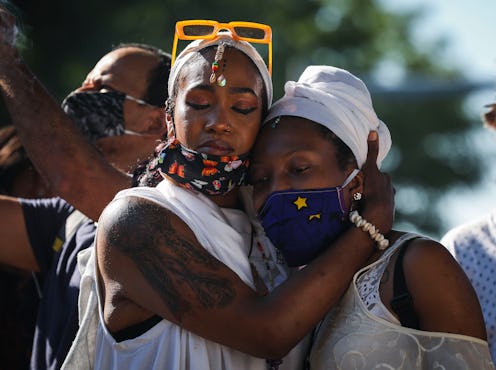Wellness
After A Month Of Protesting, Here’s How To Manage Burnout
Self-care is social justice.

A swell of Black Lives Matter protests carry on in the aftermath of the racist killings of Breonna Taylor, George Floyd, Brayla Stone, Ahmaud Arbery, and countless other Black people. Whether you've been physically hitting the pavement or not, recharging from burnout after a month of protests is not only necessary for you as an individual — it's also a vital component of keeping the movement alive.
"While most people will experience burnout at one point or another in their lives, burnout is generally temporary and most times can be worked through," says psychotherapist Tamika Covington, L.M.S.W. "On the contrary, burnout due to race relations and anti-racist movements can take a very different toll on a person's emotional, mental and physical health. A Black person is not able to simply work through their Blackness; it's there to stay."
What Causes Burnout?
Protest-related burnout is not just from the marches themselves — it's about everything that makes them necessary. "The uprisings right now are giving me hope," says Jennifer, 33, who's gone to two or three protests in New York recently. "But what my white colleagues and friends don't understand is that everything that they're just realizing about 'Black lives' is my everyday reality as a Black queer woman. This raw grief and danger is not new — it's constant and pervasive. It's great that it's hyper-visible right now in terms of creating change. But it's also even more exhausting than normal because everyone wants my view 'as a Black person' or to offer me condolences for existing." (While some white people may be feeling burnt out from grappling with white supremacy for the first time, the exhaustion and mental health damage from dealing with white fragility can be even more harmful to BIPOC.)
If you're one of the hundreds of thousands of Americans who have risen up in the streets recently, you might gain a sense of community and hope from the protests, Covington says — but there are also risks. "Burnout from attending protests can come from a legitimate fear of being arrested, physical harm, or even death," clinical social worker Valerie Proctor Greene, M.S.W., L.I.C.S.W says. "Overstimulation from adrenaline can be overwhelming and traumatic."
Aside from physical violence, the psychological toll of oppression is immense. "It is no secret that racial trauma can lead to physical symptoms," says clinical social worker Reshawna Chapple, Ph.D., L.C.S.W. "There's so much opposition to fighting for what is right and fighting for Black lives, so it makes it much more difficult and emotionally overwhelming."
How To Recognize Burnout
Burnout is about more than just feeling exhausted, says Greene. "Burnout may also include being easily distracted, having difficulty concentrating, irritability, lack of motivation, and/or poor sleep and appetite." If you already live with depression, burnout can be hard to distinguish from your everyday experiences. You might want to seek trauma-sensitive, culturally competent mental health services. "Community and feeling validated is everything," Greene says. "Finding a therapist who understands the importance of a social justice perspective within your therapy is important as well."
Chapple advises people to check in with themselves about what kinds of conversations, media, and activities make you feel extra drained. "Sometimes we feel obligated to teach everyone about racism," Chapple says. "It is okay to not get involved unless you really want to do it."
You don't have to physically attend protests to feel burnt out, either. "There’s this common theme of 'I feel like I’m not doing enough,' 'I’m exhausted,' and 'I don’t know what else I can do,'" says psychotherapist Lillyana Morales, L.M.H.C. She says that it's OK to just focus on yourself. It can be helpful to think about the oxygen mask directions that you're given on an airplane. "They always emphasize that you put your own oxygen mask on before you can help anyone. If you’re not taking care of yourself, you will not be able to give your 100%."
How To Deal With Burnout
If you're ready to get back on the streets (or go out for the first time), Covington says you should do your homework first. "It is first important to know about the organizers and how previous protests led by this group might have been structured," she tells Bustle. "Identifying friends or family that you can attend a protest with also creates an additional feeling of support and safety. Lastly, give yourself a time frame on how long you want to be out protesting."
Even if you haven't gone to marches, you might still be feeling burnt out — and that's OK. Racism has severe mental health impacts whether you're attending protests or not, and taking care of yourself amidst oppression is always crucial. "Recovering from burnout related to racist violence means first being able to identify what aspects of racial violence may be most triggering to you (e.g., talking about it, seeing racial violence on social media or the news)," Covington says. "From there, make a plan to set healthy boundaries and ensure that you are not consumed in a way that would continue to cause additional burnout moving forward. Identify individuals or groups that make up your support system and take time to do things that you love."
Experts:
Tamika Covington, L.M.S.W., psychotherapist
Reshawna Chapple, Ph.D., L.C.S.W., clinical social worker
Lillyana Morales, L.M.H.C., MA in Mental Health Counseling, psychotherapist
Valerie Proctor Greene, M.S.W., L.I.C.S.W., clinical social worker
This article was originally published on